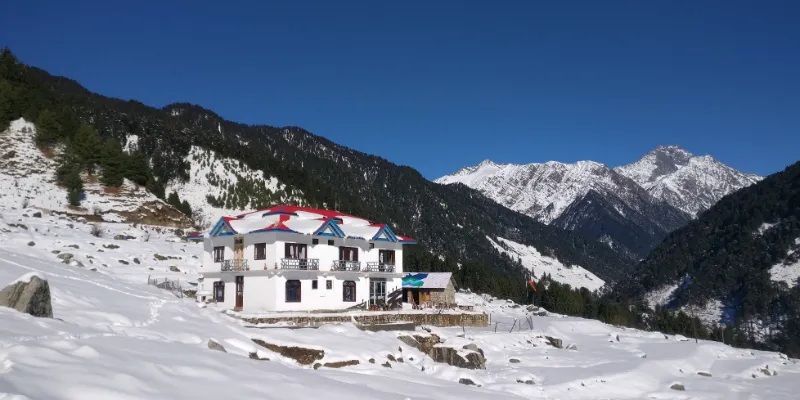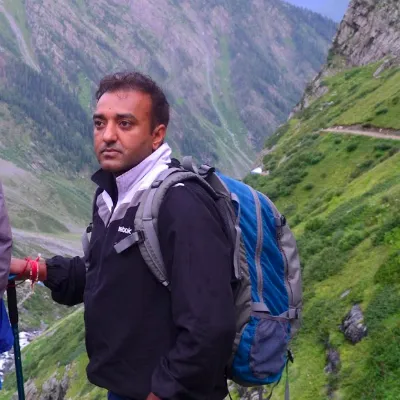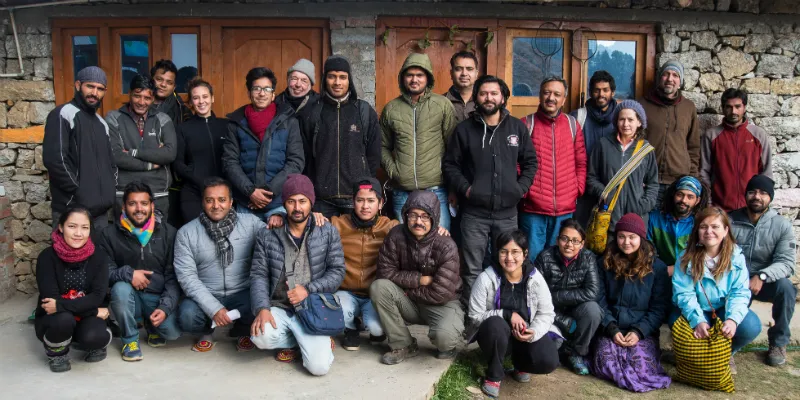Two city founders set up remotest co-working space in Raj Gundha in Himachal
Are you a wanderlust constantly looking for greener pastures in faraway lands? Do your feet itch if you remain in one geographical location for long? Are laptop and phone your office? And finally, do you consider yourself a digital nomad?

WorkationX at Raj Gundha
With the digital space widening to accommodate all kinds of users, gone are the days of cubicle-bound work. You can be on the move all the time and still clock in requisite hours at work and earn enough to fund your travel.
How exciting! But for a digital nomad working his way around India, the biggest dampener would be the connectivity. Can you expect yourself to be connected to the world while say, trekking in the Himalayas?

Rajvir Rana
Before you do that head-nod in disbelief, let’s introduce you to WorkationX. It is a brand new venture by two young men, one of them from Himachal Pradesh who, sitting at his office in Saudi Arabia on a balmy afternoon thought “well, why not?” He communicated the desire to his equally enthusiastic friend in Chandigarh who sprung on board immediately.
Headquartered in Bir in Himachal Pradesh, WorkationX was founded by Yogesh Kamra and Rajvir Rana in March 2018 as the remotest co-living and co-working space in the country.
Set up in Raj Gundha, the last village connected by road in Himachal Pradesh, WorkationX is arguably the remotest station you would ever work from.
It certainly helped the founders that there was already a building in place set up by four brothers in the area. Kamra and Rana collaborated with them to launch WorkationX from there.
Chief Brand Officer of WorkationX, Ankush Rana says that it was indeed a task to get internet to the place. “We got in touch with the GM of BSNL who happened to be the son of a former principal of the local school at Raj Gundha. He had an emotional connection to the place and helped us get the internet connectivity soon,” he says.
BSNL spent Rs 15 lakh to get the 4G service to Raj Gundha. “Now the entire village with its 28 houses and 65 residents have internet connection, thanks to WorkationX,” Rana says. Getting internet where there are no roads also turned out to be a key milestone in their journey.
With a turnover of Rs 18 lakh, the team at WorkationX is surging ahead with its ultimate goal of making reverse immigration a reality. Says Rana,
“We see a lot of youngsters leaving their homes in villages due to lack of job opportunities and livelihood.”

Yogesh Kamra
Another benefit of getting smart, digital nomads to visit the village and work there is to create a perfect forum for rural-urban dialogue and skill exchange.
“With digital nomads coming to the mountains, we can get the locals trained as freelancers by the guests. They can train and do the hand holding of the local kids in some niche technologies,” Rana explains.
Rana believes that the presence of their business and the arrival of digital nomads have had a great impact on the locals in general. Job opportunities have increased from the tourism part of the business. “There are opportunities such as guides for treks, camping, paragliding, etc,” says Rana.
He says that the advent of the internet in this tiny hamlet has also helped the locals get a better price for their cash crops as they are now better connected with the mandis.
Another interesting contribution of the business to the village is the first rocket mass heater that they designed and installed. “Rocket mass heaters save a lot of wood while it efficiently burns wood for heating. Installing it at houses in villages can be a good CSR activity for corporates who want to experience WorkationX. We are planning to invite them to experience it and replicate it in villages here,” he says.
Accommodation and pricing
About 18 guests can be put up in the building, in both dormitories and private rooms and 12 more in the tents. Apart from the accommodation and high speed internet, the facilities provided include tea/coffee, a well equipped workspace and food (both Indian and continental) on request.
There are spaces—both indoor and outdoor—to conduct workshops. The facility can be utilised for a minimum period of one day. The prices of the accommodation vary from Rs 800 per person per night and go upto Rs 2000 per person per night depending on the type of accommodation you choose.
The initial idea was to promote vacation with zero carbon emission. By offering trekking, paragliding, and mountain biking in the hills, the team got to host a lot of backpackers.
Then came the unique idea of hosting digital nomads who could spend more time (one to three months) in the village if high-speed internet is made available to them.
The digital space has been an integral part of their business journey. Other than giving internet access to an entire village, all payments from clients are cashless. Social media platforms are also being used to promote business.

WorkationX team with guests.
It all sounds hunky-dory until you hear from the founders what a task it is to get their business running during extreme weather conditions unique to the hills. Rana says heavy monsoon and harsh winters disrupt the services and the business.
Rana has a piece of advice for people who want to start similar businesses. “Tier II and III towns need to retain their smart kids who will bring the change to that place. To be sustainable, we don’t have to migrate to the cities but bring the services of the cities to the villages. Villages are great and so are the villagers,” he says. Let’s give them a chance!







